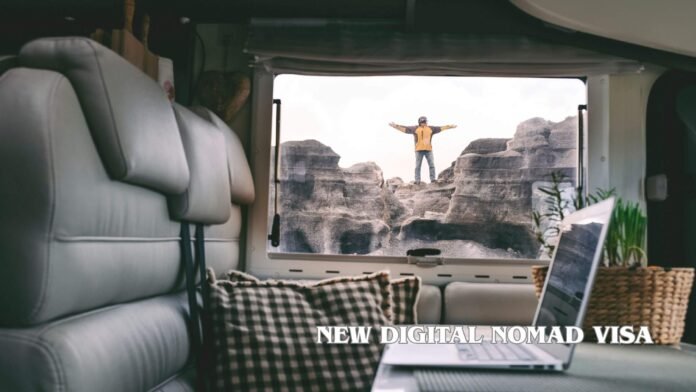
Einleitung: Warum das deutsche Digital Nomad Visa 2025 Ihr Ticket zum Tech-Hub Europas ist
Als Fernbedienung Haben Sie schon einmal davon geträumt, in einer Stadt zu leben, in der pulsierende Cafés, schnelles Internet und eine erstklassige Infrastruktur zum Alltag gehören? Stellen Sie sich vor, Sie tauschen die Isolation gegen die Coworking-Zentren Berlins oder die grünen Parks Münchens ein und sorgen gleichzeitig dafür, dass Ihre Kunden weltweit zufrieden sind.
Dieser Traum wird bald viel realistischer. Im Jahr 2025 aktualisiert Deutschland seine langjährige Visum für Freiberufler (Freiberufler-Visum). Wird oft als das angesehen, was einem Visum für Fernarbeit, Deutschland hat diese sich entwickelnde Politik angeboten, die nun als echte Deutschland digitaler Nomade Visum 2025 Option. Dieser Wandel kommt zu einer Zeit, in der Länder wie Portugal, Spanien und Kroatien hart um Telearbeiter konkurrieren. Deutschland will nicht zurückbleiben und öffnet seine Türen weiter denn je.
Warum ist das wichtig? Weil Deutschland ist nicht nur eine weitere Station auf dem Nomadenpfad. Es ist das pulsierende Herz der europäischen Tech-Szene, Heimat boomender Start-ups, globaler Konzerne und eines freiberuflerfreundlichen Ökosystems. Hinzu kommen solide Gesundheitspflege, zuverlässige Züge und einige der niedrigsten Coworking-Kosten unter den EU-Hauptstädten, und Sie haben ein Paket, dem nur wenige Berufstätige widerstehen können.
Das aktualisierte Visum verspricht:
- Längere Aufenthalte als die üblichen Touristenfreibeträge.
- Zugang zu lokalen Steuervorteilen und Verträgen das kann Ihre Glaubwürdigkeit bei europäischen Kunden steigern.
- Ein Rechtsweg, der klarer und einladender ist für Expat-Freelancer auf dem Weg nach Deutschland.
Zum Vergleich: Deutschland beherbergt bereits über 4,3 Millionen selbstständig Arbeitnehmer (Statistisches Bundesamt, 2024). Mit der Anpassung der Visabestimmungen im Jahr 2025 signalisiert das Bundesamt, dass digitale Nomaden nicht nur geduldet, sondern ausdrücklich erwünscht sind.
In diesem Handbuch erklären wir alles, was Sie müssen wissen: Voraussetzungen, Bewerbungsschritte, Insidertipps und Fallstricke, die Sie vermeiden sollten. Egal, ob Sie von Bali aus programmieren oder Marketingkampagnen von Madrid aus verwalten, Deutschlands neuer Ansatz könnte Ihre Eintrittskarte zu einem stabilen, chancenreichen Standort im Herzen Europas sein.
Also, ist die Deutsches digitales Nomadenvisum 2025 Ihr nächster großer Schritt? Lassen Sie uns eintauchen.
Der Aufstieg der Fernarbeit: Wichtige Statistiken zu digitalen Nomaden, die nach Deutschland kommen
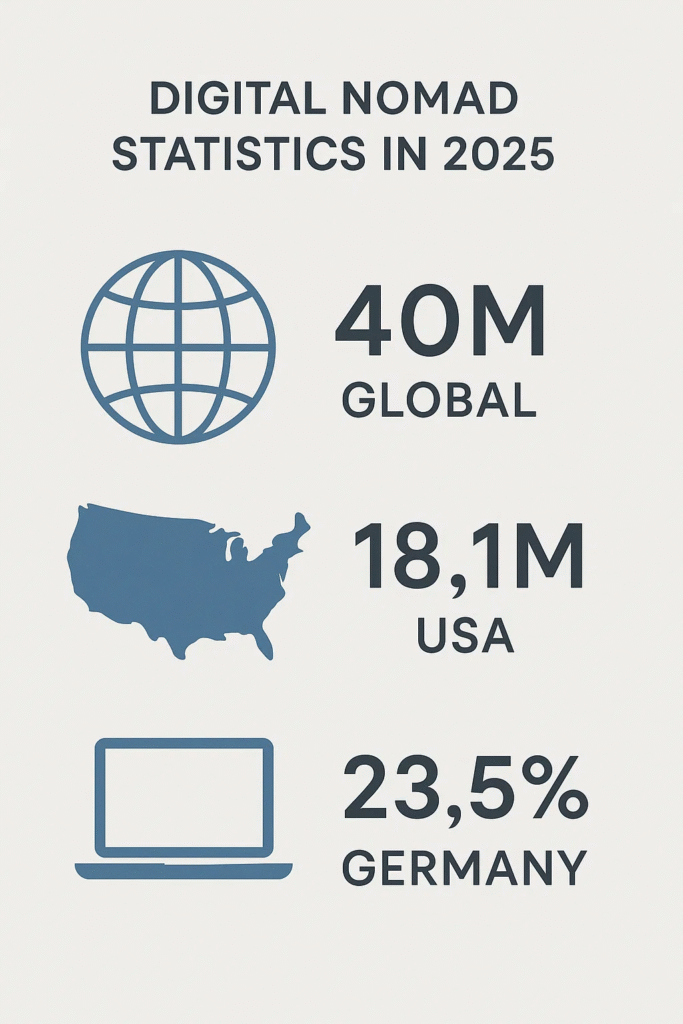
Remote-Arbeit ist kein vorübergehender Trend; sie ist die neue Normalität. Im Jahr 2025 werden mehr als 40 Millionen digitale Nomaden sind weltweit unterwegs, darunter 18,1 Millionen allein aus den USA, eine atemberaubende 147% Anstieg seit 2019 (MBO Partners, 2025). Die Nachfrage nach Visa, die diesen Lebensstil legitimieren, ist höher denn je.
Deutschland rückt ins Rampenlicht. Platz 9 weltweit für NomadenfreundlichkeitEs verbindet eine starke Infrastruktur mit der zuverlässigsten Wirtschaft Europas. Der Wandel ist bereits in der Belegschaft sichtbar:
| Metrisch | Statistik | Quelle |
|---|---|---|
| Globale digitale Nomaden im Jahr 2025 | 40M+ | MBO Partners 2025 Bericht |
| Nomaden mit Sitz in den USA | 18,1 Mio. (1471 TP3T Wachstum seit 2019) | MBO-Partner |
| Deutschland: Remote-Arbeiter (2023) | 23.5% | Eurostat |
| Stellenanzeigen in Deutschland Angebot hybrider Rollen (2025) | 15% | StepStone Deutschland |
| Wachstum der Berliner Remote-Professional-Community | +26% im Jahresvergleich | Startup Genome Berlin 2024 |
Was bedeutet das für Expats? Eine Chance. Deutschlands Telearbeitsvisum Aktualisierungen 2025 passen sich perfekt an diese Veränderungen an und geben Freiberuflern die Möglichkeit, sich in ein florierendes Netzwerk einzuklinken. Allein das Berliner Startup-Ökosystem hat eine 26% Anstieg der Zahl der Remote-Mitarbeiter im Vergleich zum Vorjahr, was es zu einem Magneten für Programmierer, Designer und Berater macht.
Mit der zunehmenden Zahl an Coworking-Zentren und der Einführung hybrider Arbeitsmodelle durch große Unternehmen ist Deutschland nicht mehr nur ein Reiseziel, sondern positioniert sich als Standort für ernsthafte, langfristige Karrieren. Für Freiberufler im Ausland auf dem Weg nach Deutschland, diese Zahlen beweisen es: Das Land ist offen für digitale Geschäfte.
Was genau ist das deutsche Digital Nomad Visa 2025?
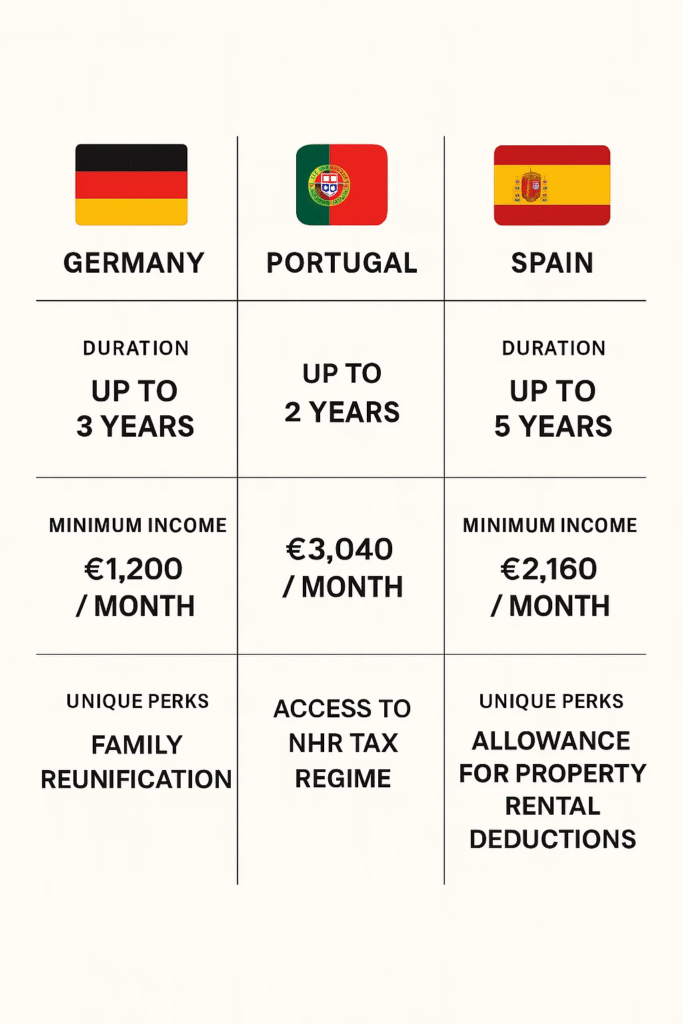
Lassen Sie uns zunächst den größten Mythos aufklären: Deutschland hat keine Visum offiziell genannt Visum für digitale Nomaden. Worüber die Leute im Jahr 2025 wirklich reden, ist die FreiberuflervisumBetrachten Sie es als Ihr goldenes Ticket für die Freiberuflichkeit, konzipiert für Selbstständige und Remote-Mitarbeiter, die legal in Deutschland leben bei der Betreuung von Kunden im Ausland.
So funktioniert es:
- Für wen ist es geeignet?: Nicht-EU/EWR-Bürger, die für ausländische Kunden aus der Ferne arbeiten oder ein eigenes freiberufliches Unternehmen betreiben. Eine Vollzeitbeschäftigung vor Ort ist im Rahmen dieser Genehmigung nicht zulässig.
- Dauer: Typischerweise gültig bis drei Jahre, mit der Option zur Erweiterung auf vier Jahre oder mehr wenn Sie weiterhin die Anforderungen erfüllen.
- Was Sie bekommen: Das Recht, in Deutschland zu leben, Kunden legal Rechnungen zu stellen, Zugang zur örtlichen Gesundheitsversorgung zu haben und sich in die größte Volkswirtschaft Europas zu integrieren.
Was gibt es Neues im Jahr 2025?
Die politischen Diskussionen verschärfen sich, da Deutschland mit Portugal und Spanien konkurriert – zwei EU-Länder, die bereits vereinfachte Visa für digitale Nomaden anbieten. Um mitzuhalten, führt Deutschland Folgendes ein:
- Optimierte Anwendungen mit kürzeren Bearbeitungszeiten.
- Klarere Einkommensgrenzen So wissen Freiberufler genau, was qualifiziert.
- Mehr Richtlinien für Remote-Arbeit, wodurch der Nachweis von Verträgen mit internationalen Kunden erleichtert wird.
Kurz gesagt, die Fernbedienung Arbeitsvisum in Deutschland Option holt endlich gegenüber ihren Mitbewerbern auf.
Schnellvergleich
| Visa-Typ | Dauer | Einkommensvoraussetzung | Hauptunterschied |
|---|---|---|---|
| Deutschland Freelancer-Visum (2025) | 3 Jahre (verlängerbar auf 4) | ~9.000–10.000 €/Jahr (variiert je nach Stadt) | Maßgeschneidert für Selbstständige/Remote-Mitarbeiter |
| Portugal: Digitales Nomadenvisum | 1 Jahr (verlängerbar, bis zu 5) | ~3.040 €/Monat | Einfacherer Einkommensnachweis, niedrigere Schwelle |
| Spanien: Visum für digitale Nomaden | 1 Jahr (verlängerbar auf bis zu 5 Jahre) | ~2.200 €/Monat | Steuervorteile über Beckham Law |
Für Expat-Freelancer auf dem Weg nach DeutschlandDieses Visum ist der praktischste Weg, um Teil des Innovationszentrums Europas zu werden, ohne dass ein Unternehmenssponsor erforderlich ist.
Zulassungskriterien für das Remote Work Visum Deutschland: Wer qualifiziert sich als Expat-Freelancer?
Sind Sie qualifiziert für die Deutsches digitales Nomadenvisum 2025? Schauen wir es uns an. Die Anforderungen sind klar, variieren aber je nach Beruf und Bewerbungsort leicht. Hier ist die Aufschlüsselung.
Kernanforderungen
Zur Bewerbung für die Fernarbeit Visum in Deutschlandbenötigen Sie:
- Nachweis über freiberufliche Tätigkeit
- Unterzeichnete Verträge mit internationalen Kunden
- Rechnungen oder Nachweise über regelmäßiges Einkommen
- Portfolio früherer Arbeiten (Designer, Autoren, Berater)
- Mindesteinkommen
- Um 1.000–2.000 € pro Monat, abhängig von den Lebenshaltungskosten der Stadt
- Berlin und München erwarten oft höhere Finanzierungsnachweise als kleinere Städte
- Krankenversicherung
- Gültige deutsche oder internationale Versicherungspolice für Ihren Aufenthalt
- Unterkunftsnachweis
- Mietvertrag, Untermietvertrag oder Anmeldung
- Sauberes Strafregister
- Zertifikat aus Ihrem Heimatland (aktuell, in der Regel weniger als 6 Monate alt)
Zusätzliche Tipps für IT-Profis und Freiberufler
Wenn Sie im Technologiebereich tätig sind, ist Deutschland besonders einladend:
- Entwickler: GitHub-Repos, Open-Source-Beiträge oder aktive Freelance-Verträge anzeigen.
- Designer/Kreative: Teilen Sie ein Online-Portfolio oder frühere Kundenarbeiten.
- Berater/Vermarkter: Absichtserklärungen von Kunden erhöhen die Glaubwürdigkeit.
Je eindeutiger Ihre Nachweise, desto reibungsloser verläuft Ihr Antrag. Sie zeigen der Einwanderungsbehörde damit, dass Sie finanziell stabil und wirklich selbstständig sind.
Einbeziehung der Familie
Gute Neuigkeiten: Ihre Lieben können mitkommen. Visum für Freiberufler ermöglicht Ihnen die Beantragung von:
- Ehegatten-/Partnervisa (Sie können auch Arbeitsrechte erhalten).
- Visa für unterhaltsberechtigte Kinder (mit Zugang zu Deutschlands starkem öffentlichen Bildungssystem).
Seien Sie einfach bereit, ein höheres Einkommen oder Ersparnisse nachzuweisen, um sie zu unterstützen.
Kurz-Checkliste
Mindesteinkommen 1.000–2.000 € monatlich
Gültige Krankenversicherung
Registrierte Adresse in Deutschland
Kundenverträge und Portfolio
Keine Vorstrafen
Zusätzliche Unterlagen, wenn Sie Familienmitglieder mitbringen
Wenn Sie diese Kästchen ankreuzen können, sind Sie auf dem besten Weg, Deutschlands Telearbeitsvisum 2025.
Die Vorteile: Wie dieses Visum das Leben für freiberufliche Expats in Deutschland verändert
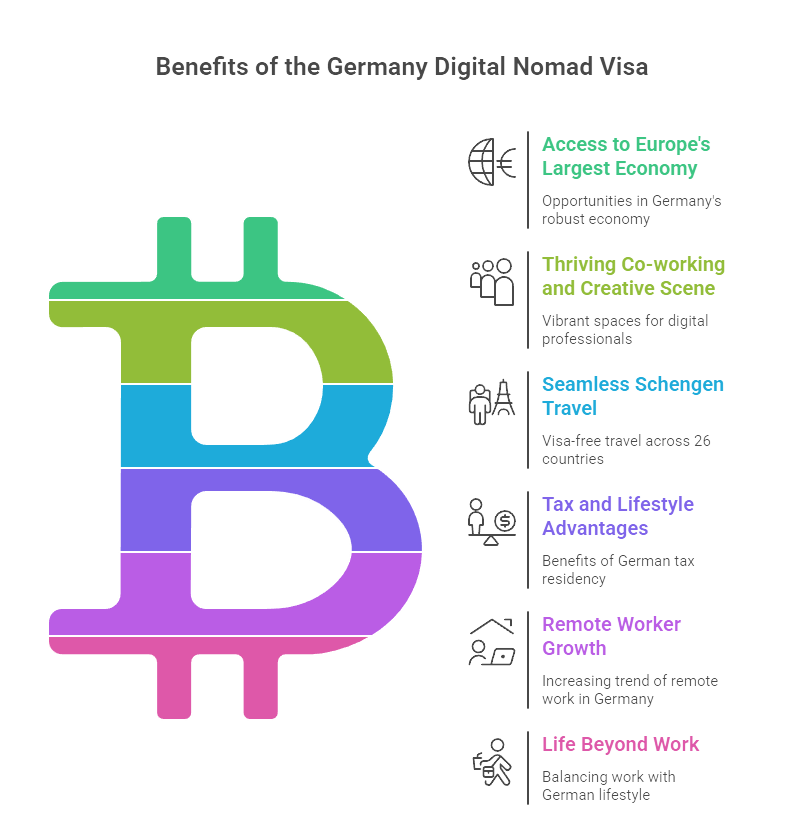
Landung der Deutsches digitales Nomadenvisum 2025 Es geht nicht nur um Papierkram, sondern darum, eine neue Art zu leben und zu arbeiten zu ermöglichen. Für im Ausland lebende Freiberufler gehen die Vorteile weit über den legalen Aufenthalt hinaus.
Zugang zur größten Volkswirtschaft Europas
Deutschland ist Europas Kraftzentrum. Mit der größten Volkswirtschaft der EU und einem 77,2% Beschäftigungsquote im Jahr 2023, Chancen erstrecken sich über alle Branchen hinweg. Auch wenn Ihre Kunden im Ausland sind, sind Sie mit Ihrem Standort in Deutschland im Zentrum globaler Geschäftsströme. Networking auf Konferenzen in Berlin oder Pitching in Frankfurt geben Ihrem freiberufliche Karriere sofortige Glaubwürdigkeit.
Eine florierende Coworking- und Kreativszene
Vergessen Sie die Arbeit am Küchentisch. Deutschland bietet unzählige Räume für Digitalprofis:
- Allein Berlin verfügt über Über 500 Coworking-Hubs, von schicken Lofts in Mitte bis zu Industriehallen in Kreuzberg.
- München und Hamburg bieten elegante Räumlichkeiten in der Nähe von Großkonzernen, perfekt für Berater und IT-Experten.
- Auch mittelgroße Städte wie Leipzig und Stuttgart bilden kreative Cluster.
Sie werden von gleichgesinnten Nomaden, Unternehmern und Einheimischen umgeben sein, allesamt potenzielle Mitarbeiter.
Nahtlose Schengen-Reisen
Halten eines Fernarbeit Visum in Deutschland Auch Zuschüsse Zugang zum Schengen-Raum. Das sind 26 Länder, die Ihnen für Wochenendausflüge oder Kundentreffen zur Verfügung stehen. Stellen Sie sich vor: Genießen Sie am Freitag das Oktoberfest in München, fliegen Sie am Samstag zu einer Designmesse in Paris und kehren Sie am Sonntagabend in Ihre Berliner Wohnung zurück – ohne zusätzliche Visa.
Steuer- und Lifestyle-Vorteile
Deutschland folgt dem 183-Tage-Regel für die Steueransässigkeit. Verbringen Sie ein halbes Jahr oder länger hier und profitieren Sie von einem der strukturiertesten und zugleich lohnendsten Steuersysteme der Welt. Für Freiberufler kann das bedeuten:
- Zugang zu Doppelbesteuerungsabkommen (damit Sie nicht zweimal zahlen).
- Die Möglichkeit, Geschäftsausgaben wie Coworking-Gebühren, Laptops oder sogar Konferenzreisen abzusetzen.
- Stabilität: Kunden schätzen es, zu wissen, dass Sie in der EU legal ansässig sind.
Wachstum freisetzen: Statistiken zu Remote-Arbeitern in Deutschland
- 77,2% Beschäftigungsquote (2023): umfangreiche Networking-Möglichkeiten für Freiberufler.
- 361 T T der Berufstätigen arbeiten bereits mobil: Remote-Kultur ist die Norm, nicht die Ausnahme.
- 26% Wachstum im Vergleich zum Vorjahr in der abgelegenen Gemeinde Berlins: ein Beweis dafür, dass die Szene boomt.
Leben jenseits der Arbeit
Die Vorteile sind nicht nur finanzieller Natur. Stellen Sie sich vor, Sie trinken nach einem Kundengespräch in New York Glühwein auf einem Weihnachtsmarkt. Oder Sie radeln am Rhein entlang, bevor Sie sich in einen Programmiersprint stürzen. Ein kanadischer Designer in Berlin drückte es so aus: „Ich bin wegen des Visums gekommen, aber wegen des Lebensstils geblieben. In Deutschland fällt die Vereinbarkeit von Beruf und Privatleben leicht.“
Für Freiberufler im Ausland auf dem Weg nach DeutschlandDieses Visum ist nicht nur eine Genehmigung, sondern ein Pass für Chancen, Reisen und Gemeinschaft.
Schrittweiser Antragsprozess für das deutsche Digital Nomad Visa 2025
Die deutsche Bürokratie hat einen schlechten Ruf, aber keine Sorge, wir unterstützen Sie. Die Fernarbeit Visum in Deutschland Der Prozess ist strukturiert und erreichbar, wenn Sie die Schritte befolgen. Hier ist Ihr Fahrplan.
1. Sammeln Sie Ihre Dokumente
Beginnen Sie mit einer Checkliste. Normalerweise benötigen Sie:
- Gültiger Reisepass (mindestens noch 6 Monate gültig).
- Ausgefülltes Visumantragsformular.
- Geschäftsplan Erläuterung Ihrer freiberuflichen Tätigkeit.
- Kundenverträge, Rechnungen oder Absichtserklärungen.
- Nachweis über finanzielle Mittel (Kontoauszüge mit einem Jahreseinkommen von 9.000–10.000 €).
- Krankenversicherung für Deutschland.
- Unterkunftsnachweis (Mietvertrag oder Gastgeberbrief).
- Aktuelle Überprüfung des polizeilichen Hintergrunds.
Profi-TippHinweis: Wenn Ihre Dokumente nicht auf Deutsch vorliegen, lassen Sie sie beglaubigen. Viele Anträge verzögern sich aufgrund fehlender oder nicht übersetzter Unterlagen.
2. Bewerben Sie sich bei Ihrer örtlichen deutschen Botschaft
Nicht-EU-Bürger beantragen zunächst eine 3-Monats-Einreisevisum bei der nächstgelegenen deutschen Botschaft oder dem nächstgelegenen deutschen Konsulat. Bringen Sie alle Ihre Dokumente mit, zahlen Sie die Gebühr und erwarten Sie ein kurzes Interview.
- Visagebühr: 75–100 €.
- Bearbeitungsdauer: 6–12 Wochen, je nach Standort.
3. Ankunft in Deutschland und Anmeldung vor Ort
Nach der Landung gibt es zwei wichtige Schritte:
- Registrieren Sie Ihre Adresse (Anmeldung) bei Ihrem örtlichen Bürgeramt.
- Vereinbaren Sie einen Termin bei Ihrer Ausländerbehörde, um Ihr Einreisevisum in ein Aufenthaltserlaubnis für Freiberufler (gültig bis zu 3 Jahre, verlängerbar auf 4 Jahre).
Bringen Sie die Originale aller Dokumente sowie Ihren neuen Zulassungsnachweis mit.
4. Gebühren zahlen und auf die Genehmigung warten
Bei der Einwanderungsbehörde zahlen Sie die Gebühr für die Aufenthaltserlaubnis (normalerweise in den ursprünglichen Visumkosten enthalten) und lassen Ihre Fingerabdrücke scannen. Die Genehmigung dauert oft einige Wochen, aber in der Zwischenzeit erhalten Sie in der Regel eine vorübergehende Aufenthaltserlaubnis.
Häufige Fehler, die Sie vermeiden sollten
- Unvollständiger Geschäftsplan: Reichen Sie nicht nur einen Lebenslauf ein, sondern zeigen Sie, wie sich Ihre freiberufliche Tätigkeit rentiert.
- Keine Kundenverträge: Mindestens zwei unterzeichnete Verträge oder Absichtserklärungen erhöhen die Wahrscheinlichkeit einer Genehmigung.
- Übersetzungen überspringen: Deutsche Behörden akzeptieren selten ausschließlich englischsprachige Dokumente.
Zeitleisten-Schnappschuss
- Botschaftsantrag → 6–12 Wochen.
- Einreisevisum genehmigt → 3 Monate Reisezeit.
- Anmeldung vor Ort + Aufenthaltserlaubnis → 4–8 Wochen nach Ankunft.
Wenn Sie organisiert bleiben, ist der Prozess überschaubar und Ihre Belohnung ist eine Rechtsbasis in einer der dynamischsten Volkswirtschaften Europas.
Potenzielle Fallstricke und wie man sie vermeidet: Real Talk für Remote-Mitarbeiter

Deutschland ist ein idealer Standort für digitale Nomaden, birgt aber auch Herausforderungen. Bleiben wir realistisch und lösen wir diese, bevor sie uns ins Stolpern bringen.
Hohe Lebenshaltungskosten
Berlin, einst das Zentrum der billigen Kreativität, sah Mieten steigen 2025 um 101 TP3TMünchen und Frankfurt sind sogar noch teurer. Lösung? Nutzen Sie Budget-Apps wie N26 oder Monese, um Ihre Ausgaben im Auge zu behalten, und ziehen Sie Sekundärstädte wie Leipzig oder Dresden in Betracht, wo die Kosten niedriger sind, aber die Gemeinden florieren.
Steuerliche Komplexität
Der 183-Tage-Regel kann Sie zu einem Steuerinländer machen, auch wenn Ihre Kunden im Ausland sind. Deutschlands Steuer Das System ist gründlich und die Pflicht zur Einreichung von Steuererklärungen ist auf Deutsch. Überlassen Sie es nicht dem Zufall; beauftragen Sie einen englischsprachigen Steuerberater, um Strafen und Doppelbesteuerung zu vermeiden.
Sprachbarrieren
Obwohl Berlin und München englischsprachig sind, wird Papierkram fast immer auf Deutsch verfasst. Verträge, Bankformulare und offizielle Schreiben werden in der Landessprache verfasst. Die Lösung? Beauftragen Sie zertifizierte Übersetzer für offizielle Dokumente und nutzen Sie Apps wie DeepL für alltägliche Aufgaben. Bonus-Tipp: Ein Grundkurs Deutsch ist im Alltag sehr hilfreich.
Letztes Wort
Diese Hürden sind real, aber kein Grund zur Sorge. Mit Planung können Sie den Stress umgehen und sich auf den Aufbau Ihrer freiberuflichen Karriere konzentrieren. Für Freiberufler im Ausland auf dem Weg nach Deutschland, Vorbereitung ist das Geheimnis, um den Lebensstil ohne Kopfschmerzen zu genießen.
Deutschland vs. Portugal und Spanien: Warum das Remote Work Visum Deutschland wählen?
Portugal und Spanien haben die Szene der digitalen Nomaden mit Sonne, Meer und vereinfachten Visa dominiert. Doch 2025 bietet Deutschland eine clevere Alternative für Telearbeiter, die mehr als nur Strandblick wollen.
Schnellvergleich
| Land | Visumdauer | Min. Einkommen | Einzigartiger Vorteil |
|---|---|---|---|
| Deutschland | 3 Jahre (verlängerbar auf 4+) | ~1.500 €/Monat | Tech-Ökosystem + stärkste Wirtschaft der EU |
| Portugal | 1 Jahr (verlängerbar auf bis zu 5 Jahre) | ~3.040 €/Monat | Günstiger Lebensstil + Atlantikstrände |
| Spanien | 1 Jahr (verlängerbar auf bis zu 5 Jahre) | ~2.200 €/Monat | Steuervorteile nach dem Beckham-Gesetz |
Warum Deutschland wählen?
- Stabilität bei Sonnenschein: Deutschland bietet wirtschaftliche Sicherheit, erstklassige Gesundheitsversorgung und einen robusten Rechtsrahmen. Sie jagen nicht nur dem Sonnenuntergang hinterher, sondern bauen eine nachhaltige Karrierebasis auf.
- Innovationszentrum: Berlin, München und Hamburg beherbergen einige der am schnellsten wachsenden Startups Europas. Für IT-Profis, Berater und Kreative bieten sich unzählige Möglichkeiten zum Networking.
- Längere Gültigkeit des Visums: Während Portugal und Spanien Nomaden auf kurze Verlängerungen beschränken, 3–4 Jahre Aufenthaltserlaubnis gibt Ihnen Freiraum zum Einleben, Planen und Wachsen.
- Zentrale Lage: Von Berlin aus ist Paris eine Flugstunde entfernt; Prag ist mit dem Zug schnell zu erreichen. Von Deutschland aus ist der gesamte Schengen-Raum in Reichweite.
Deutschland hat vielleicht nicht Portugals Surfen oder Spaniens Tapas, aber für Expat-Freelancer auf dem Weg nach Deutschland, es ist eine leistungsstarke Wahl: zuverlässig, vernetzt und innovationsorientiert.
Fazit: Bereit für Ihr Deutschland-Abenteuer?
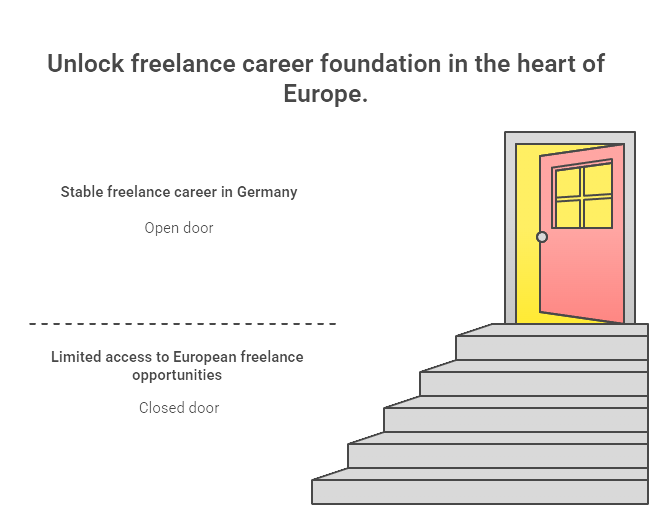
Sie haben inzwischen gesehen, wie die Deutsches digitales Nomadenvisum 2025 ist mehr als nur Papierkram; es ist ein Tor. Längere Aufenthalte, eine florierende Freelancer-Szene, Reisefreiheit im Schengen-Raum und Zugang zu Europas größter Volkswirtschaft machen dies zur idealen Wahl für Telearbeiter, die Stabilität und Chancen suchen.
Ja, der Bewerbungsprozess erfordert Planung. Aber mit den richtigen Unterlagen, einem klaren Einkommensnachweis und etwas Geduld lässt sich der Traum verwirklichen. Deutschland verspricht keine Palmen, sondern etwas Wertvolleres: eine Grundlage für Ihre freiberufliche Karriere im Herzen Europas.
Sind Sie bereit, den Sprung zu wagen? Beginnen Sie Ihre Reise noch heute:
- Laden Sie unsere kostenlose Bewerbungscheckliste herunter um organisiert zu bleiben.
- Buchen Sie eine Visa-Beratung mit einem Experten, um Ihre Genehmigung zu beschleunigen.
Im Laufe des Jahres 2025 wird die Deutschland: Digitales Nomadenvisum 2025 ist Ihre Brücke zu einer ausgeglichenen, grenzenlosen Karriere. Stellen Sie sich vor, Sie programmieren in einem Berliner Café oder präsentieren Kunden, bevor Sie mit dem Zug nach Paris fahren. Das ist nicht nur ein Umzug, sondern eine Neuorientierung.
Ihr neues Kapitel in Deutschland wartet.

